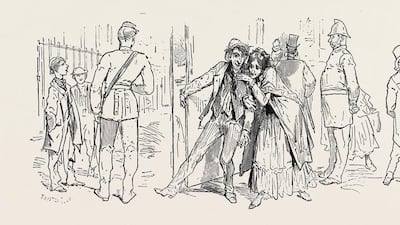In April 1868, Charles Dickens was travelling to England by sea after a lengthy reading tour of America. As he made that journey, his thoughts turned to 1836, the year that – as a result of the serialised appearance of The Pickwick Papers – did so much to establish his reputation and that offered Dickens an experience that he would still regard as formative when he looked back on it 30 years later.
“In the winter of 1836”, he wrote as he crossed the Atlantic, “I held an infant in my arms. The child, a girl eight months of age, was living under the most deplorable conditions that existed in London at that time. Since then, I have often wondered what happened to the child.”
This recollection – so typical of Dickens in its obsession with suffering, injustice, its fascination with untold stories – provides the basis for the narrative we are offered in Thomas Hauser's latest novel, The Baker's Tale: Ruby Spriggs and the Legacy of Charles Dickens.
This is not the first time that Hauser, who has now published 47 works of fiction and non-fiction (on subjects as diverse as boxing, Beethoven and the legacy of Chernobyl), has turned to Dickens: his novel of 2014, The Final Recollections of Charles Dickens, told the story of Dickens's dying days in a powerfully reimagined version of Victorian London. Yet where this work placed Dickens at the heart of its story ("I am Dickens", says the narrator on its opening page), The Baker's Tale affords him a less central presence.
Here, in a manner that is taut, brisk, atmospheric, seductive, Hauser tells the story of the orphaned Ruby Spriggs (a version of the infant Dickens held in his arms in 1836) and her escape from poverty in 19th-century London. When we meet her she is 3 years old and in the care of her benevolent uncle, Christopher Spriggs. Together they lead a desperate and itinerant life, until one day they find themselves the beneficiaries of the kindness of a stranger. Their saviour is a baker named Antonio, who was himself once the beneficiary of a philanthropic stranger by the name of Octavius Joy, an honest man of considerable means, and the closest thing in the book to a version of Dickens (on occasion Hauser has him speak Dickens’s phrases, as if they are his own).
Between them, Octavius and Antonio secure for Ruby and Christopher a home (and for Christopher, employment) at the bakery of the recently bereaved Marie Wells. In the course of their lives there, we follow Ruby and Christopher as they are lifted out of poverty, begin to find a place in the world, and eventually learn to read: the civilising and liberating nature of reading is one of this book’s – and one of Dickens’s – great themes. By the time she is 16, Ruby has acquired sufficient education to teach at one of Octavius’s centres for learning, which he has established (again one thinks of Dickens himself) with the purpose of educating the very poor. At this stage of the book, in one of its many painful, direct and moving scenes, Christopher dies.
The rest of the novel covers Ruby’s falling in love with a young and handsome man named Edwin Chatfield, who works in the coal industry, hates his employer, loves reading and longs to teach – an ambition that, thanks to a chance (and beautifully comic) encounter with Octavius Joy, he is able to realise. It is in the course of teaching that he meets Ruby, and the two of them cement their relationship by reading together the works of Dickens. For a time they are happy, then enter a malevolent and avaricious coal baron to ensure that the path of young love is not uninterestingly smooth.
There are moments at which Hauser's telling of this story sags; and his prose often lacks precision. But this novel contains so much pure narrative pleasure, and so much to enjoy in the form of Dickensian arcana, themes and motifs, as to make such criticisms feel unimportant. The Baker's Tale is a book to be read quickly and indulgently, and in thrall to the joys of story. It is a wonderfully diverting achievement.
Matthew Adams is a London-based reviewer who writes for the TLS, the Spectator and the Literary Review.

